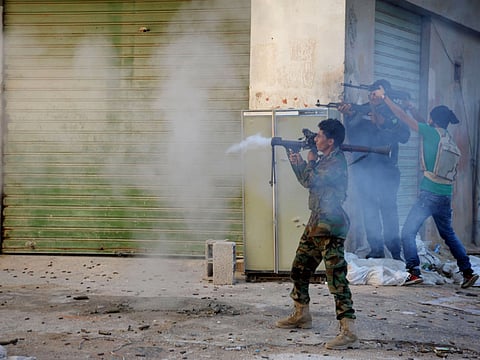In Libya, Daesh can only be defeated militarily
Under Belhaj, Daesh is expanding in and around Sirte

With the continuing saga of the on-again, off-again United Nations-sponsored talks to “unify” the opposing sides in the Libyan struggle, the Catch-22 situation became codified in a UN Support Mission in Libya (UNSMIL) press release, following the Morocco ‘talks’ the other day: “... there is agreement that nothing is agreed on until everything is agreed on”. What? The rush by the UN to reconcile the warring sides to build a new unity government in Rabat seems to be an ill-conceived attempt to settle the political scene, presumably in the hope that international military action can be avoided. Meanwhile, the democratically-elected, internationally-recognised Tobruk government, represented by the House of Representatives (HOR), wants military equipment now to bring order to the country while the illegal Tripoli Dawn coalition, which includes the defunct General National Congress (GNC), tries to break the UN sanctions regime as much as possible with visits to, of all places, Ukraine.
During the Morocco talks, the Libyan Ambassador to the UN, Ebrahim Dabbashi, made an impassioned speech at the Security Council last week, in which he called for exemptions on the arms embargo. Dabbashi said that military efforts should be deployed alongside political ones.
Britain, inexplicably, seems to be bungling the situation whenever Libya is involved in a security equation. Dabbashi stated that Britain did “not want the Libyan army to resolve its conflict with terrorist groups and militias currently in control of Tripoli” and accused London of playing “a very obvious game” in its efforts to block the lifting of the ban.
Britain’s position appears to be angering other countries with more defined counter-terrorism policies, such as France, the UAE and Egypt, who all see the dangers of the emerging extremist threat. Even the US seems to be cozying up to the French, as seen by the unusual recent visit of America’s most senior general, Martin Dempsey, to a French aircraft-carrier in the Arabian Gulf, the Charles de Gaulle. The visit reflected improving ties between the US and French armed forces and shows perhaps that the Pentagon knows better than the White House what needs to be done to degrade and destroy Daesh (self-proclaimed Islamic State of Iraq and the Levant). It also shows that the UK’s importance to America is fast diminishing in the 21st Century. ‘East of Suez’ is dead on arrival.
Another worrisome development is the rise of Abdul Hakim Belhaj, who was armed by the US as part of the Nato campaign to oust Muammar Gaddafi. Reportedly, Belhaj has emerged as the leader of Daesh. It is important to recall that Belhaj was a founder of the Al Qaida-affiliated Libyan Islamic Fighting Group (LIFG). Belhaj has recently been on CNN and other international networks ridiculously touting his alleged democratic values. A bad joke!
Under Belhaj, Daesh is expanding in and around Sirte, thereby capturing more sea-front real estate in its merchantilist expansion. And it is not, it seems, capturing but actually trying to destroy Libyan oil facilities. Daesh is not fooling around with the kidnapping of nine oil workers, including Europeans; expect further executions very soon.
Also Daesh may be eyeing Mediterranean Sea lanes for its next economic project. To date, the group has not been a seaborne threat except on Levantine rivers. But do not be surprised if they pursue piracy as another means of income and terror. Imagine, for a moment, the devastating economic consequences that Daesh could reap on shipping and the pleasure-craft industry in the Mediterranean, impacting countries like Malta, Italy and Greece. So not only is there a requirement for land-based kinetic action against these terrorists, but also at sea. To boot, Nigeria’s Boko Haram has now declared allegiance to Daesh and there are intersections between the two terrorist groups along the arc of instability from West Africa to the Maghreb. Their joint target will surely be the sea lanes of Europe.
It should come as little surprise that the man to the rescue is General Khalifa Haftar, who is now the Supreme Commander of the Libyan Armed Forces. Haftar is now garnering support in western Libya and he is becoming a nation-wide folk hero, though there exists a huge PR campaign to discredit him.
Haftar’s actions curry favour with those who support a future Libyan state with a stronger hand, much like Egypt today. He does not want to just rout the terrorist threat, he wants to crush it. Haftar’s persona and character lend themselves to be compared to other robust leaders. The main difference, however, is the fact that there is no evidence that he seeks political office.
With Haftar’s military promotion, it may very well be that, encouraged by Russia, President Abdul Fattah Al Sissi will give Haftar even more support by sending Egyptian forces to help stomp out Daesh in Libya.
Unfortunately, the UN is caught in a Catch-22 situation while people die in Libya and the bad guys expand exponentially across the Middle East and North Africa region.
Richard Galustian is a business and security analyst who has lived in Libya since 2011.


